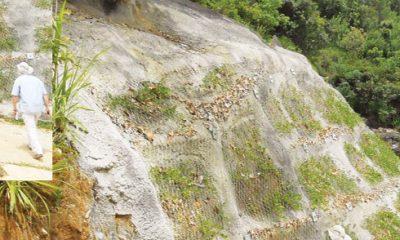Business
GSP+ withdrawal: How would it impact Sri Lanka’s economy?

By Asanka Wijesinghe and Eleesha Munasinghe
Sri Lanka’s preferential access to the vital European Union (EU) market faces fresh challenges after the European Parliament’s special resolution adopted in June 2021. The resolution calls for an assessment on “whether there is sufficient reason, as a last resort, to initiate a procedure for the temporary withdrawal of Sri Lanka’s GSP+ status.”.
The GSP+ is a non-reciprocal trading arrangement whereby Sri Lanka does not have to lower tariffs in return but is required to implement certain non-trade related conventions to benefit from preferential access. The GSP+ arrangement slashes import duties to zero for vulnerable low and lower-middle-income countries that implement 27 international conventions related to human rights, labour rights, environment protection, and good governance. This article assesses the impact of a hypothetical withdrawal of GSP+ on Sri Lanka’s exports to the EU: the largest single trading bloc, with the United Kingdom (UK), accounting for 30% of Sri Lanka’s exports.
The Impact
A possible withdrawal of GSP+ will increase the tariffs for Sri Lankan products up to the Most Favoured Nation (MFN) tariffs. Consequently, products coming from Sri Lanka will be more expensive in the EU market, directly reducing the export demand from Sri Lanka. However, Sri Lanka’s competitors that continue to benefit from the EU’s GSP will face zero preferential tariffs. Thus, in addition to the trade destruction effect, with the relative price of goods from Sri Lanka being higher, the trade will be diverted to those competitors. Using a partial equilibrium analysis, one can ex-ante quantify these effects of GSP+ withdrawal. Assuming the UK will follow the EU lead, and Sri Lanka will face the lower bound of relevant MFN tariffs, partial equilibrium estimates show that Sri Lanka’s exports to the EU will fall by 627 USD million The simulations are done taking 2019 as the base year.
The worst-hit sectors are apparel (HS 61 and HS 62), tobacco (HS 24), seafood (HS 03), and rubber (HS 40) sectors. The combined loss for the apparel sector will be as much as 494 USD million, and it is 79% of the total estimated trade loss. In addition, the seafood sector is deemed to lose 20 USD million or 17% of the sector’s 2019 exports to the EU. Thus, losing preference to a vital market will be hard for the recovering seafood industry
There are two caveats of an ex-ante impact assessment of this kind. The first is that the analysis is based on assumed elasticities. However, the assumptions are not overly restrictive. The second is that all the eligible exports from Sri Lanka do not utilise the GSP+ facility. Thus, the actual impact will be contingent upon the utilisation ratio. However, after Sri Lanka regained GSP+ preference in 2017, the utilisation ratio increased, reaching 61.8% in 2019, improving from 55.1% in 2017. Therefore, the increasing utilisation ratio makes the potential impact still significant.
Notably, there is a variation of the utilisation rate within the HS chapters, .
The apparel sector will be relatively resilient to a loss of preference as its utilisation ratio was 52% in 2019. However, a loss of preference will halt any industry drive that aims to increase the utilisation rate and then expand the market share in the EU. Further, the 2010 loss of GSP+ inflicted high costs to the industry. As seafood, rubber products, and footwear sectors utilise more than 90% of GSP+ preference, those sectors will be more vulnerable to the shock. Indeed, the difference between GSP+ preferential tariff and MFN tariff for seafood is higher -zero versus 7.5% respectively aggravating the impact.
Future Steps
The losses from GSP+ preference will be significant and heterogeneous across sectors. The GSP+ also opens the door for EU investments as outsourcing production to preference receivers is beneficial to the EU. In addition, sectoral losses may spillover to the overall economy exacerbating poverty and income inequality. Thus, avoiding such losses should be a political priority for policymakers. Less dependence on the EU market is a widely suggested strategy. Diversification is indeed beneficial when it is done for economic reasons. However, ad-hoc moves to diversify to escape from unresolved political issues will not do much good. The EU market is a high-end export destination for Sri Lanka. The quality improvements, product standards, and consumer preferences positively challenge the Sri Lankan exporters to improve product quality and competitiveness.
Additionally, a non-reciprocal preference for various products incentivises product diversification away from traditional exports into more complex products like electronic equipment, including semiconductors (HS chapter 85). Therefore, while Sri Lanka should work to secure the GSP+ resolving the current political issues and focus on fully utilising GSP+ preference in the short run. In the long run, as GSP+ is contingent upon income level, Sri Lanka will lose it someday, and as such should enter into reciprocal trade agreements with the EU and other high-end markets, including the US.
Link to blog: https://www.ips.lk/talkingeconomics/2021/09/28/gsp-withdrawal-how-would-it-impact-sri-lankas-economy/
Asanka Wijesinghe is a Research Economist at the Institute of Policy Studies of Sri Lanka (IPS) with research interests in macroeconomic policy, international trade, labour and health economics. He is also interested in the impact of adjustment costs of trade, gravity modelling in trade, econometrics and the trade origins of populist politics. He has undertaken efficiency analyses, particularly public spending efficiency, using parametric and non-parametric efficiency analysis approaches.
Asanka holds a BSc in Agricultural Technology and Management from the University of Peradeniya, an MS in Agribusiness and Applied Economics from North Dakota State University, and an MS and PhD in Agricultural, Environmental and Development Economics from The Ohio State University. His latest research focused on the effect of global trade-induced labour market changes on voting behaviour in recent US elections, including the 2016 presidential election.
Eleesha Munasinghe was a research intern at IPS. She is currently an undergraduate (Economics and Finance) at New Castle University in UK.
Business
Wealth Trust Securities to raise Rs. 500.8 million via IPO

The recent announcement of Wealth Trust Securities Ltd.’s Rs. 500.8 million Initial Public Offering -IPO- comes at a moment when Sri Lanka’s interest-rate environment is gradually easing, allowing well-capitalised primary dealers to expand their trading portfolios and secure long-term positions in government securities.
Company chairman Senaka Weerasooria told journalists in Colombo that the IPO is not merely a capital-raising exercise, but a reinforcement of the disciplined structure that has defined the company since its inception.
He noted that WTS enters the public market with what is already one of the most robust capital bases in the industry, and with “absolute confidence that investors are joining a journey that has consistently returned value.”
Weerasooria said the capital infusion will further solidify WTS’s ability to absorb volatility, particularly amid cyclical movements in Treasury yields.
Despite maintaining a conservative trading outlook, the company has managed to average a 31% ROE over the past twelve years — a figure management repeatedly highlighted as evidence of resilience across both tightening and loosening rate cycles.
Managing Director and CEO Romesh Gomez said that in recent months the direction of policy rates and market liquidity has begun shifting favourably, creating clear value-accretion opportunities for disciplined portfolio expansion. With additional capital, he noted, WTS has greater room to capture advantageous auction positions, broaden secondary market activity and align its investment scale to emerging market windows.
Gomez acknowledged that FY25 reflected compressed performance due to systemic realignment, with revenue at Rs. 4.6 billion and PAT at Rs. 1.2 billion. However, he pointed out that profit sustainability, even through a difficult cycle, speaks to strong operational controls. The A- rating with a Positive outlook continues to stand, reinforcing the company’s position as a stable counterparty in a specialised sector.
Asia Securities Advisors, managing the IPO, pointed out that the offer price of Rs. 7 presents meaningful upside when benchmarked against underlying valuation metrics. The move into the listed environment, they noted, enhances governance visibility — a point increasingly valued among institutional investors participating in the Government securities market.
By Ifham Nizam
Business
BoardPAC achieves Carbon Neutral Certification for the fourth consecutive year

BoardPAC, the global leader in digital board meeting automation, has secured the Carbon Neutral Certification for 2024, marking the fourth consecutive year the company has achieved this milestone. The certification, awarded by the Sri Lanka Climate Fund (SLCF) under the Ministry of Environment in October 2025, underscores BoardPAC’s commitment to environmental sustainability and responsible corporate governance.
BoardPAC’s operations, spanning over 40 countries, were assessed against the ISO 14064 – 1:2018 standard, and the company’s organization-level Greenhouse Gas (GHG) emissions were successfully offset, reflecting its ongoing commitment to reducing its environmental impact.
Business
Uber marks 10 years in Sri Lanka: Moving People, Powering Livelihoods, Impacting Communities

Uber today marked ten years of operations in Sri Lanka, a decade in which the platform has reshaped how people commute, and how thousands of Sri Lankans earn a livelihood. Over the past decade, ride-hailing has become one of the most transformative shifts in Sri Lanka’s urban mobility landscape, providing safe, reliable and affordable transport at scale.
Chathuranga Abeysinghe, Deputy Minister for Entrepreneurship, Ministry of Industries and Entrepreneurship Development, Government of Sri Lanka, graced the milestone event as the Chief Guest. U.S. Ambassador Julie Chung attended as the Guest of Honor, joined by Akanksha Singh, Head – South Asia Markets, Uber, and Kaushalya Gunaratne, Country Manager – Mobility, Uber Sri Lanka.
As per the 2024 Sri Lanka Economic Impact Report, compiled by global policy research firm – Public First, Uber and Uber Eats together generated over LKR 160 billion in economic activity in Sri Lanka within a single year. Since its entry in Sri Lanka in 2015, Uber rides have covered over 1.15 billion kilometers – equivalent to nearly 3000 trips from Earth to the moon! Over 320,000 Sri Lankans have earned through the platform as drivers.
Uber has also supported the tourism ecosystem, enabling more than 700,000 airport trips, connecting visitors seamlessly to their destinations. Over the last year, we’ve further intensified our service in the Western and Central provinces and expanded our offerings in the Southern and Northern provinces – bringing its services closer to more communities across the country. Uber has emerged as one of the most preferred ride-hailing platforms across the island, offering affordable, reliable, and safer rides at different price points.
Deputy Minister for Entrepreneurship, Ministry of Industries and Entrepreneurship Development, Government of Sri Lanka, Chathuranga Abeysinghe, said, “Over the past decade, Uber has become part of the fabric of daily life in Sri Lanka – not only by helping people get where they need to go, but by enabling thousands to earn an income with dignity and flexibility.
-

 News3 days ago
News3 days agoOver 35,000 drug offenders nabbed in 36 days
-

 News7 days ago
News7 days agoLevel III landslide early warning continue to be in force in the districts of Kandy, Kegalle, Kurunegala and Matale
-

 Business5 days ago
Business5 days agoLOLC Finance Factoring powers business growth
-

 News5 days ago
News5 days agoCPC delegation meets JVP for talks on disaster response
-

 News5 days ago
News5 days agoA 6th Year Accolade: The Eternal Opulence of My Fair Lady
-

 News2 days ago
News2 days agoCyclone Ditwah leaves Sri Lanka’s biodiversity in ruins: Top scientist warns of unseen ecological disaster
-

 News3 days ago
News3 days agoRising water level in Malwathu Oya triggers alert in Thanthirimale
-

 Features4 days ago
Features4 days agoThe Catastrophic Impact of Tropical Cyclone Ditwah on Sri Lanka:













